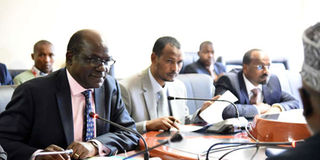IEBC staff to be vetted afresh, says Wafula Chebukati

From left, IEBC chairman Wafula Chebukati, commissioners Prof Yusuf Guliye and commissioner Molu Boya when they appeared before the Senate Justice, Legal Affairs and Human Rights Committee. IEBC staff will be vetted afresh. PHOTO | FILE | NATION MEDIA GROUP
What you need to know:
Commissioner Abdi Guliye said a total of 400 staff would undergo public vetting before the end of this year with those who don’t meet expectations to be shown the door.
Mr Guliye said all procurement of election materials should be completed six months before the General Election so as to enhance transparency.
Mr Chebukati however, said the work of the taskforce was halted following the resignation of three commissioners in April this year.
In a raft of proposals presented before the Senate Legal Affairs Committee on its plans after the 2017 elections, the commission’s chairman, Mr Wafula Chebukati, said institutional restructuring would eliminate duplicity of functions, overlapping of roles and a culture of “silo mentality”.
Mr Chebukati said the vetting of staff would enhance effectiveness and accountability.
“There is a need to undertake public vetting of all staff manning critical functions where stakeholders will be given an opportunity to raise concerns about our staff,” Mr Chebukati said.
PUBLIC VETTING
Commissioner Abdi Guliye said a total of 400 staff would undergo public vetting before the end of this year with those who don’t meet expectations to be shown the door.
“We have too many bosses at Anniversary Towers; some have silo mentality. They will have to undergo public vetting and for those that will not meet our expectations, we will have to discuss an exit strategy,” Prof Guliye said.
The commission is also proposing a review of its internal procurement processes to conform to the Public Procurement and Assets Disposals Act, 2015 and for enhanced transparency.
“The current cost of elections in Kenya is very high, which could be partly attributed to pilferage and wastage of public resources through procurement of various goods and services at the commission,” Mr Chebukati said.
PROCUREMENT
Mr Guliye said all procurement of election materials should be completed six months before the General Election so as to enhance transparency and avoid court battles that run up to a few days to the poll.
On the legal review front, the commission is proposing prohibition of any amendments to the election laws one year to the General Election.
The Chebukati-led commission also wants to re-locate from the CBD and acquire its own premises to cut on costs such as rent, hiring of venues for various commission activities and warehousing.
Concerned by the disruption of businesses by opposition supporters last year during protests calling for resignation of chief executive Ezra Chiloba and IEBC officials, the commission wants to move from the CBD for the interest of the city business community.
FORMED TASKFORCE
The commission has already formed a taskforce compromising of the commissioners and the secretariat who are currently working on a location and the cost of the proposal.
Already the taskforce has come up with name of the new building as ‘Uchaguzi Centre’ and will be meeting with Treasury and relevant departmental committees soon to firm up the rest of the plan.
“The taskforce will consult the National Treasury, parliamentary committees before finally developing a cogent proposal. The rest of the details are yet to be firmed up and we will most certainly communicate once the taskforce has developed a report,” Mr Chebukati said.
Mr Chebukati however, said the work of the taskforce was halted following the resignation of three commissioners in April this year.
The proposals are aimed at strengthening the commissions’ systems and forge a united front ahead of the 2022 elections.
POST-ELECTION EVALUATION
Mr Chebukati said prior to the resignation of the three commissioners, various programmes and activities such as the post-election evaluation, continuous voter registration, continuous voter education, legal reform, preparations for boundary delimitation and general policy approvals for elections had been approved in the plenary meetings.
“The commission as currently composed is overseeing the implementation of the approved activities, however, approval of new policies will have to be differed awaiting the restoration of a quorate commission. We therefore urge the relevant authorities to institute appropriate processes to fill the vacant positions in our membership in accordance with the law,” Mr Chebukati said.





